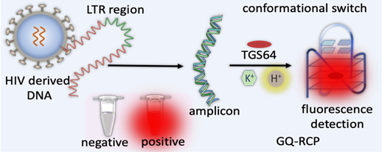Recently, the researchers at Jawaharlal Nehru Centre for Advanced Scientific Research (JNCASR) have developed a technology for targeted detection of the HIV-genome derived G-Quadruplex (GQ), a four-stranded DNA structure, using a fluorometric test.
- It enhances the reliability of HIV diagnosis and significantly reduce false positives in HIV detection.

- They created the GQ Topology-Targeted Reliable Conformational Polymorphism (GQ-RCP) platform, originally designed for SARS-CoV-2 detection, and successfully adapted it for HIV diagnosis, demonstrating its modular versatility.
- A key aspect of the study published in Analytical Chemistry was the demonstration of a pH-mediated, single-step transition of dsDNA into the GQ conformation, enabling selective detection.
- This transition forms the target for detection using a benzobisthiazole-based fluorescent probe (TGS64), paving the way for a reliable diagnostic platform.
- Benefits
- This molecular detection platform can be integrated into existing nucleic acid-based diagnostic systems, offering enhanced reliability through sequence-specific recognition.
- It addresses the challenge of false positives in amplification-based techniques by enabling unambiguous detection of the target GQ (noncanonical nucleic acid conformation).
- The GQ-RCP-based platform is adaptable for detecting various DNA/RNA-based pathogens, including bacteria and viruses.
Improving HIV-1 Diagnosis
- The human immunodeficiency virus type 1 (HIV-1), the retrovirus causing the acquired immunodeficiency syndrome (AIDS), remains a global health threat.
- Widely used HIV diagnostics may miss early infections and produce false positives due to cross-reactivity. Other early detection methods suffer from reduced sensitivity and prolonged processing times.
- Current nucleic acid-based diagnostics are prone to false positives due to general DNA probes that can’t distinguish between nonspecific and target amplicons.
- Targeting specific nucleic acid sequences, such as unique G-Quadruplex (GQ) structures in pathogenic genomes, offers a significant advancement in developing precise diagnostic analysis.

